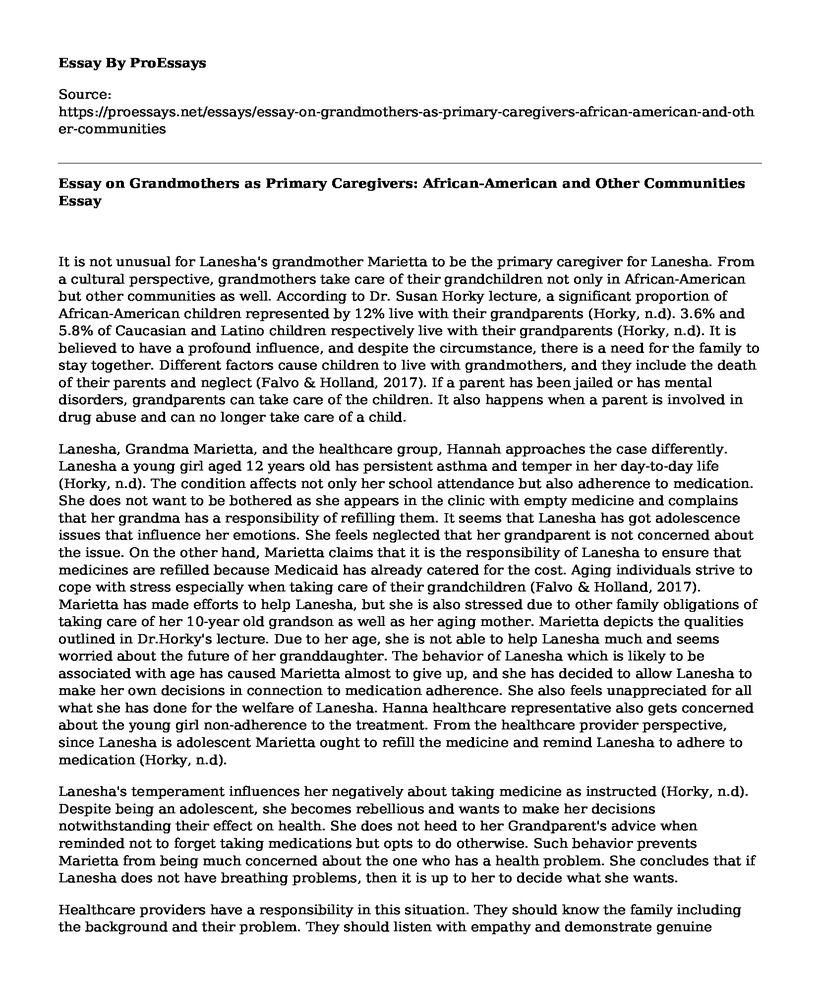It is not unusual for Lanesha's grandmother Marietta to be the primary caregiver for Lanesha. From a cultural perspective, grandmothers take care of their grandchildren not only in African-American but other communities as well. According to Dr. Susan Horky lecture, a significant proportion of African-American children represented by 12% live with their grandparents (Horky, n.d). 3.6% and 5.8% of Caucasian and Latino children respectively live with their grandparents (Horky, n.d). It is believed to have a profound influence, and despite the circumstance, there is a need for the family to stay together. Different factors cause children to live with grandmothers, and they include the death of their parents and neglect (Falvo & Holland, 2017). If a parent has been jailed or has mental disorders, grandparents can take care of the children. It also happens when a parent is involved in drug abuse and can no longer take care of a child.
Lanesha, Grandma Marietta, and the healthcare group, Hannah approaches the case differently. Lanesha a young girl aged 12 years old has persistent asthma and temper in her day-to-day life (Horky, n.d). The condition affects not only her school attendance but also adherence to medication. She does not want to be bothered as she appears in the clinic with empty medicine and complains that her grandma has a responsibility of refilling them. It seems that Lanesha has got adolescence issues that influence her emotions. She feels neglected that her grandparent is not concerned about the issue. On the other hand, Marietta claims that it is the responsibility of Lanesha to ensure that medicines are refilled because Medicaid has already catered for the cost. Aging individuals strive to cope with stress especially when taking care of their grandchildren (Falvo & Holland, 2017). Marietta has made efforts to help Lanesha, but she is also stressed due to other family obligations of taking care of her 10-year old grandson as well as her aging mother. Marietta depicts the qualities outlined in Dr.Horky's lecture. Due to her age, she is not able to help Lanesha much and seems worried about the future of her granddaughter. The behavior of Lanesha which is likely to be associated with age has caused Marietta almost to give up, and she has decided to allow Lanesha to make her own decisions in connection to medication adherence. She also feels unappreciated for all what she has done for the welfare of Lanesha. Hanna healthcare representative also gets concerned about the young girl non-adherence to the treatment. From the healthcare provider perspective, since Lanesha is adolescent Marietta ought to refill the medicine and remind Lanesha to adhere to medication (Horky, n.d).
Lanesha's temperament influences her negatively about taking medicine as instructed (Horky, n.d). Despite being an adolescent, she becomes rebellious and wants to make her decisions notwithstanding their effect on health. She does not heed to her Grandparent's advice when reminded not to forget taking medications but opts to do otherwise. Such behavior prevents Marietta from being much concerned about the one who has a health problem. She concludes that if Lanesha does not have breathing problems, then it is up to her to decide what she wants.
Healthcare providers have a responsibility in this situation. They should know the family including the background and their problem. They should listen with empathy and demonstrate genuine concern to offer help. They should also problem solve with the family. In this situation, Lanesha does not obey her grandparent's instructions. Healthcare providers can seek the help of a close relative such as uncle or aunt to talk to the girl to adhere to medications (Falvo & Holland, 2017). They can also educate Lanesha on the importance of taking medications as instructed and failure to do so can have a detrimental effect on one's health. It is also crucial to refer the family to the counselor if need be.
References
Horky, S. (n.d.). Social Emotional and Cultural Variables Affecting Adherence. Retrieved from: https://support.mchtraining.net/national_ccce/case1/lecture/player.html
Falvo, D., & Holland, B. E. (2017). Medical and psychosocial aspects of chronic illness and disability. Jones & Bartlett Learning.
Cite this page
Essay on Grandmothers as Primary Caregivers: African-American and Other Communities. (2022, Dec 29). Retrieved from https://proessays.net/essays/essay-on-grandmothers-as-primary-caregivers-african-american-and-other-communities
If you are the original author of this essay and no longer wish to have it published on the ProEssays website, please click below to request its removal:
- Tool Creation, Visitation, and Analysis of an Organization Paper Example
- How Native Americans Were Affected by the US 1778-1900
- Essay on Organization of Sporting Events for Success: Football Guidelines
- Research Paper on Technology: Impact on Globalization & Society
- Global Connectivity, Wireless and Wired Technologies - Essay Sample
- G2Q: Multinational Water Commodification Company - Essay Sample
- "The Good Life" Found in Relationship and Community, Hospitality, And Freedom - Paper Sample







